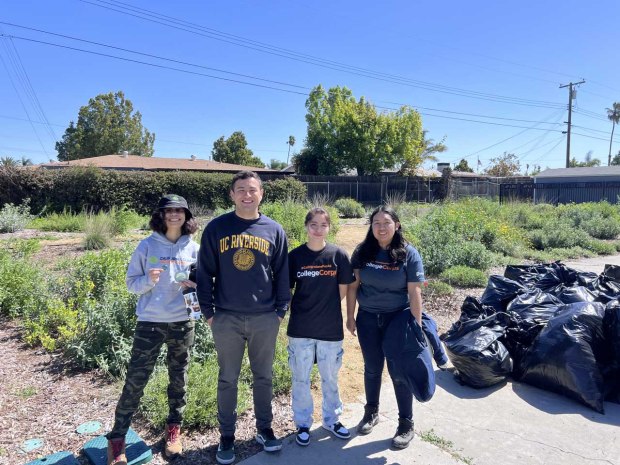Inland Southern California Climate Collaborative staff members, from left, Jazmin Anguiano, Alyssa Gomez, Eric Calderon and Ashley Jackson, attend the UC Riverside School of Medicine Center for Health Disparities’ Research Symposium in 2023. (Courtesy of UC Riverside)
By Rebecca K. O’Connor | Contributing Columnist
Inland Southern California Climate Collaborative, a regional collaboration serving San Bernardino, Riverside and Imperial counties, aims to support local environmental organizations and leaders.
The collaborative was launched in 2019 through CivicWell, which designated the Los Angeles-based organization Climate Resolve as the fiscal sponsor. Climate Resolve took on the groundwork of recruitment and building a collaborative with a goal of transferring leadership to an in-region agency. In 2022, the ISC3 Steering Committee was formed and the collaborative joined the Alliance of Regional Collaborative for Climate Adaptation.
UC Riverside’s School of Public Policy and Office of Sustainability became the new coordinators for the collaborative in fall 2023. The collaborative sees its role as mobilizing members around a shared vision and policy agenda that will catalyze action to address climate change and adaptation across the region. It also plans to be a resource hub with information on funding, assistance and research.
The collaborative partnered with Climate Resolve to produce its first research report in 2022. It noted that the region is expected to see daily maximum temperatures increase by 8 to 14 degrees and areas burned by wildfires increase by 60% to 75% by the end of the century. The Landscape Analysis Report for the Inland Southern California Region gives an overview of these climate impacts in Inland Southern California as well as the work being done by municipalities to adapt to the impacts. The report also compiles a list of current and state federal funding opportunities that could support these efforts.

“The needs are stark and for most people who live here, they know the summers are getting hotter, it’s harder to see the mountains sometimes and the air is getting worse,” said Eric Calderon, assistant director of the Center for Social Innovation. “We’re seeing more trucks, more development and less open spaces. It’s important to at least talk about it.”
Today, membership in the collaborative is comprised of cities, counties, public agencies, businesses and tribal agencies as well as community-based and nonprofit organizations. It holds meetings that can be attended virtually as well as in-person networking events. Its members have attended panels, toured the California Air Resources Board Facility, the Arlington Desalter System, the SCE Food Technology Center and gathered for a nature walk at the Robert Redford Conservancy.
“We have really great speakers and have time for members in the beginning to share their work and their successes. That kind of discussion creates a lot of a-ha moments and connections,” Calderon said. “As great as it is to be able to see people on Zoom however, a lot of the magic happens in person when you can connect one on one.”
The collaborative also provides opportunities for the public to get together, learn, share information and make connections. On Wednesday, April 10, from 11 a.m. to 3 p.m., it will host a celebration of contributions to the climate action movement by Inland Empire communities of color. The Culture & Climate Action Event will be at the UCR Alumni & Visitors Center and is free and open to the public.
The collaborative invites leaders, organizations and businesses to become members and is always seeking new collaborations. In the future, it plans to do further research and will need assistance in gathering community voices across the diverse geography of a region where environmental challenges and solutions vary. The collaborative also encourages regional organizations to reach out if they need a letter of support or technical assistance for a grant. The collaborative can also help match co-applicants for grant applications.
“We just want people to know that we are an open door,” Calderon said. “If you need help connecting, we’ll help you. We can help bridge that gap.”
Information: iscclimatecollaborative.org or isc3@ucr.edu
Register for the Culture & Climate Action Event by clicking here.
Rebecca K. O’Connor is the co-executive director of Rivers & Lands Conservancy, a 2023 California Arts Council fellow and the author of several books on the natural world. She writes about nature on her Substack at writtenbird.com.
Rivers & Lands Conservancy connects our community to natural, wild, and open spaces of Southern California through land conservation, stewardship and education.






